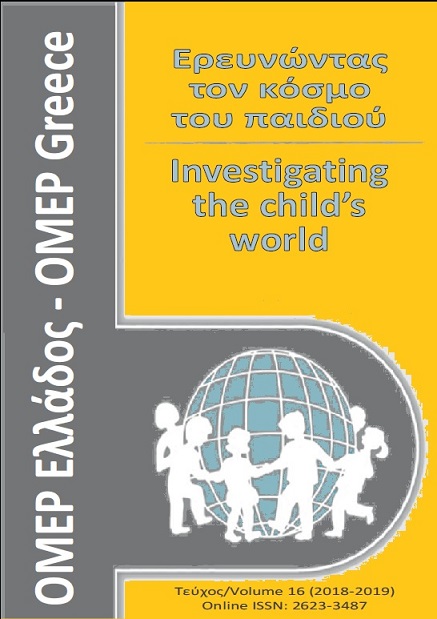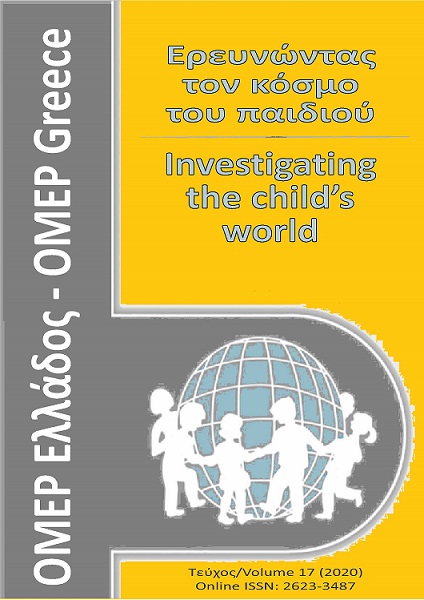Άνδρες παιδαγωγοί σε παιδικούς σταθμούς: Αντιλήψεις για το ρόλο και την απουσία τους. Μια ποιοτική προσέγγιση.

Περίληψη
Η μελέτη διερεύνησε τις αντιλήψεις και εμπειρίες δώδεκα παιδαγωγών προσχολικής αγωγής σε παιδικούς σταθμούς του νομού Θεσσαλονίκης, σχετικά με το ρόλο και την απουσία παιδαγωγών ανδρικού φύλου από τους παιδικούς σταθμούς. Η συλλογή δεδομένων έγινε με ατομικές ημι-δομημένες συνεντεύξεις ενώ η επεξεργασία τους πραγματοποιήθηκε με τη μέθοδο της θεματικής ανάλυσης. Αναδείχτηκαν τρεις κύριες θεματικές που αφορούν το ρόλο και την παρουσία ανδρών παιδαγωγών στους παιδικούς σταθμούς: α) παράταιρη η παρουσία των ανδρών, β) πατρικά πρότυπα στον παιδικό σταθμό και γ) γυναικεία υπόθεση η φροντίδα των μικρών παιδιών. Τα ευρήματα υπογραμμίζουν ότι τα κοινωνικά πρότυπα, οι κοινωνικές προσδοκίες και η έλλειψη υποστήριξης αποτελούν σοβαρά εμπόδια για την αύξηση της ανδρικής παρουσίας στον τομέα αυτό. Είναι έντονη η ανάγκη εισαγωγής προγραμμάτων που αποσκοπούν αρχικά στη διατήρηση των ανδρών παιδαγωγών στους παιδικούς σταθμούς και σε δεύτερο χρόνο εφαρμόσιμες καλές πρακτικές για την αύξηση τους.
Λεπτομέρειες άρθρου
- Πώς να δημιουργήσετε Αναφορές
-
Γρηγορόπουλος Η. Ν. (2020). Άνδρες παιδαγωγοί σε παιδικούς σταθμούς: Αντιλήψεις για το ρόλο και την απουσία τους. Μια ποιοτική προσέγγιση. Ερευνώντας τον κόσμο του παιδιού, 16, 42–57. https://doi.org/10.12681/icw.19006
- Τεύχος
- Τόμ. 16 (2019)
- Ενότητα
- Επιστημονική αρθρογραφία & εκπαιδευτικές δράσεις

Αυτή η εργασία είναι αδειοδοτημένη υπό το CC Αναφορά Δημιουργού – Μη Εμπορική Χρήση 4.0.
Οι Συγγραφείς που δημοσιεύουν εργασίες τους σε αυτό το περιοδικό συμφωνούν στους παρακάτω όρους:
Οι Συγγραφείς διατηρούν τα Πνευματικά Δικαιώματα και χορηγούν στο περιοδικό το δικαίωμα της πρώτης δημοσίευσης ενώ ταυτόχρονα τα πνευματικά δικαιώματα της εργασίας προστατεύονται σύμφωνα με την Creative Commons Attribution License που επιτρέπει σε τρίτους - αποδέκτες της άδειας να χρησιμοποιούν την εργασία όπως θέλουν με την προϋπόθεση της διατήρησης των διατυπώσεων που προβλέπονται στην άδεια σχετικά με την αναφορά στον αρχικό δημιουργό και την αρχική δημοσίευση σε αυτό το περιοδικό.
Οι Συγγραφείς μπορούν να συνάπτουν ξεχωριστές, και πρόσθετες συμβάσεις και συμφωνίες για την μη αποκλειστική διανομή της εργασίας όπως δημοσιεύτηκε στο περιοδικό αυτό (π.χ. κατάθεση σε ένα ακαδημαϊκό καταθετήριο ή δημοσίευση σε ένα βιβλίο), με την προϋπόθεση της αναγνώρισης και την αναφοράς της πρώτης δημοσίευσης σε αυτό το περιοδικό.
Το περιοδικό επιτρέπει και ενθαρρύνει τους Συγγραφείς να καταθέτουν τις εργασίες τους μέσω διαδικτύου (π.χ. σε ένα ακαδημαϊκό καταθετήριο ή στους προσωπικές τους ιστοσελίδες) πριν και μετά από τις διαδικασίες της δημοσίευσης, καθώς αυτό μπορεί να οδηγήσει σε παραγωγική ανταλλαγή ιδεών και σκέψεων καθώς επίσης και σε γρηγορότερη και μεγαλύτερη χρήση και ευρετηρίαση της δημοσιευμένης εργασίας (See The Effect of Open Access).



